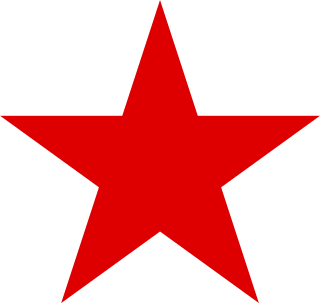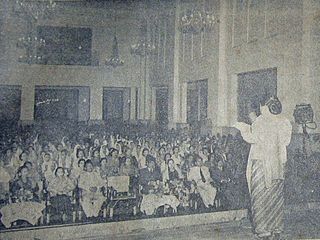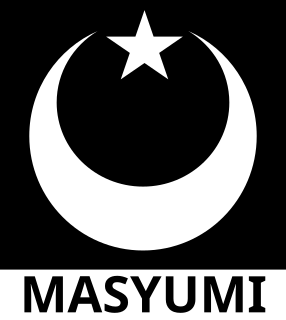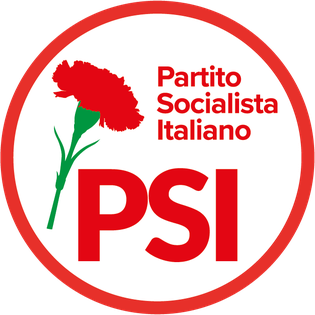Related Research Articles
Psi or the initials PSI or Ψ may refer to:

The Parti Rakyat Malaysia is a democratic socialist political party in Malaysia. Established on 11 November 1955 as Partai Ra'ayat, it is one of the older political parties in Malaysia and traces its pedigree to the anti-colonial movements from the pre World War II period like the Kesatuan Melayu Muda. After being politically inactive for a long time, the party contested in Penang, Kedah and Selangor in the 2018 elections. However, the party failed to win a single state or parliamentary seat. It is unrepresented in the Dewan Rakyat and state legislative assemblies of Malaysia.

The Socialist Party of Indonesia was a political party in Indonesia from 1948 until 1960, when it was banned by President Sukarno.

Barisan Sosialis is a defunct political party in Singapore. It was formed on 29 July 1961 and officially registered on 13 August 1961 by left-wing members of the People's Action Party (PAP) who had been expelled from the PAP. The prominent founding members of the Barisan were Dr Lee Siew Choh and Lim Chin Siong. It became the biggest opposition party in Singapore in the 1960s and the 1980s. The main objectives of the Barisan included eradicating colonialism, establishing a united independent and democratic Malayan nation comprising the Federation of Malaya and Singapore and introducing an economic system to promote prosperity and stability in society. The party was merged into the Workers' Party of Singapore in 1988.

A referendum on the terms of integration into the Federation of Malaysia was held in Singapore on 1 September 1962. The idea for a referendum to be held was championed by then-Prime Minister Lee Kuan Yew of the People's Action Party (PAP). Opposition parties, notably the Barisan Sosialis (BS), were not satisfied with the framing of the referendum, as it did not allow voters the choice of rejecting the merger altogether. Despite such dissatisfaction, the referendum was carried out with three options being offered to voters.

The Italian Socialist Party was a socialist and later social-democratic political party in Italy, whose history stretched for longer than a century, making it one of the longest-living parties of the country.
GWS may refer to:
People's Youth was the youth wing of the Communist Party of Indonesia (PKI). The organisation was formed as the Socialist Youth of Indonesia. Initially the organisation was set up on the initiative of then Minister of Defence Amir Sjarifuddin, as the youth wing of the Socialist Party of Indonesia. A congress was held on 10 and 11 November 1945, where seven locally based youth outfits merged. Rapidly it gained a membership of around 25,000. The organisation took part in the armed struggle for independence during the Indonesian National Revolution. Pesindo units were engaged in fighting against British forces.

Gerwani was a women's organization founded as Gerwis in Semarang on 4 June 1950.

General elections were held in Italy on 19 May 1968 to select the Fifth Republican Parliament. Democrazia Cristiana (DC) remained stable around 38% of the votes. They were marked by a victory of the Communist Party (PCI) passing from 25% of 1963 to c. 30% at the Senate, where it presented jointly with the new Italian Socialist Party of Proletarian Unity (PSIUP), which included members of Socialist Party (PSI) which disagreed the latter's alliance with DC. PSIUP gained c. 4.5% at the Chamber. The Socialist Party and the Democratic Socialist Party (PSDI) presented together as the Unified PSI–PSDI, but gained c. 15%, far less than the sum of what the two parties had obtained separately in 1963.

The Masyumi Party was a major Islamic political party in Indonesia during the Liberal Democracy Era in Indonesia. It was banned in 1960 by President Sukarno for supporting the PRRI rebellion.

The Italian Socialist Party is a social-democratic political party in Italy.
The Madiun Affair, known locally as the Communist Party of Indonesia rebellion of 1948, was an armed conflict between the government of the Self-proclaimed Republic of Indonesia and the left-wing opposition group, Front Demokrasi Rakyat during the Indonesian National Revolution. The conflict began on 18 September 1948 in Madiun, East Java, and ended three months later when most FDR leaders and members were detained and executed by TNI forces.

Islamic Association Party of Indonesia was an Islamic political party in Indonesia. In 1973 it was merged into the United Development Party.
Kongres Buruh Seluruh Indonesia was a trade union centre in Indonesia. It was politically linked to the Socialist Party of Indonesia (PSI). KBSI was founded in 1952, in an attempt from the socialists to counter the influence of the PKI-led SOBSI trade union centre.
Gerakan Tani Indonesia was a peasants organization in Indonesia. It was politically linked to the Socialist Party of Indonesia (PSI). GTI was founded in September 1954. The socialists had previously worked alongside communists in the Barisan Tani Indonesia, but had split away from BTI in August 1954 in protest of communist dominance over the organization. At the time of its foundation, GTI claimed a membership of 1.5 million. It initially had 24 branches, but expanded to have 100 branches nationwide two years later.
Isteri-Sedar was a women's organization established in Bandung, Indonesia in 1930 by Soewarni Pringgodigdo. It was a radical nationalist group founded on its anti-polygamy stance after the First Indonesian Women's Congress in 1928.
The Socialist Party was a political party in Indonesia. It was founded in December 1945 at a meeting in Cheribon, as the Socialist People's Party (Paras) of Prime Minister Sutan Sjahrir and the Socialist Party of Indonesia (Parsi) of Defence Minister Sjarifuddin merged. Sjahrir became chairman of the unified party, whilst Sjarifuddin became vice-chairman.

The Malayan Peoples' Socialist Front or better known as Socialist Front (SF) was a left-wing coalition of Malaysian socialist parties. It is noted as the longest-standing opposition coalition in Malaysian general election history. The coalition was formed by Partai Rakyat (PR) and Parti Buruh Malaya (PBM) on Hari Merdeka. In 1964, National Convention Party (NCP) joined the coalition. PR left the coalition in 1965 and NCP soon become inactive. PBM, the only remaining party in SF, abandoned it on 10 January 1966 and reverted to its own banner. It took 21 years before another opposition coalition formed in Malaysia: Angkatan Perpaduan Ummah (APU) and Gagasan Rakyat (GR) in 1990.
Feminism in Indonesia refers to the long history of discourse for gender equality to bring about positive social change in Indonesia. The issues women in Indonesia currently are facing include gender violence, underage marriages, and lack of representation in the political system. Feminism and the women's right movement began during colonial Indonesia under Dutch rule and were spearheaded by the national heroine Kartini. She was a Javanese noblewoman who advocated for the education of all women and girls regardless of social status. In the early 19th century, women's rights organizations and movements were allowed to developed under Budi Utomo, the first Indonesian Nationalist organization. Modern day Indonesian feminism include and are influenced by both fundamentalist and progressive Islamic women's organizations.
References
- ↑ Wijono. The General Elections in Indonesia and the Partai Sosialis Indonesia, in Socialist Asia, Vol IV, November 1955/February 1956, Nos. 3-4. pp. 16-17
- 1 2 Elizabeth Martyn (10 November 2004). The Women's Movement in Postcolonial Indonesia: Gender and Nation in a New Democracy. Routledge. p. 216. ISBN 978-1-134-39470-8.
| This article about an Indonesian political party is a stub. You can help Wikipedia by expanding it. |